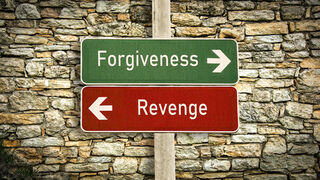Forgiveness
Getting Even or Forgiving: Which Is Better?
Some say that revenge is sweet. What does the research say about this?
Posted January 22, 2021
I watched a short film recently in which a jilted lover found true love with another partner. When she meets her former partner years later, he is not doing well and she thrives. The reaction that seems to be induced in viewers is this: a rush of satisfaction and a sense that getting even is good. I then went to another short film by the same producers with the same result: a fired employee thrives in the future as the boss does not. What particularly fascinated me was this: These films had been viewed over 50 million times.

What is it that so satisfied viewers? I think it is the age-old response of getting even or revenge. As the saying goes, revenge is sweet. So, I looked into the scientific literature that contrasts getting even and forgiving or gently being good to those who are not good to you.
Here is what I found in seven points:
1. When bad things happen to people, there is more to the response than the dichotomy of getting even or forgiving. There can be a range of responses such as a) short-term anger showing that one should not be treated with disrespect (Murphy, 2005); b) getting even without causing great pain to the other; c) revenge or vengeance in which the intent is to hurt the other because of what happened (Strelan, Van Prooijen, & Gollwitzer, 2020); and d) forgiveness for unjust treatment (Enright & Fitzgibbons, 2015). For the sake of this essay, we will not focus on short-term righteous anger that quickly fades as described by Murphy, but instead on the getting even and revenge-side compared with forgiving the one or ones who acted unfairly.
2. In a study by Ysseldyk, Matheson, and Anisman (2019) of psychologically abused women, those who had a motive toward revenge, as well as those participants who focused on forgiveness, both showed high cortisol levels of the brain, a sign of stress. Yet, and here is where the difference enters, the quest for revenge was associated with psychological depression whereas forgiveness was not. Forgiveness is more psychologically advantageous in the long-term because it is not associated with depression, but instead with the statistically significant reduction in depression (Freedman & Enright, 1996).
3. Similar to the above study, Strelan, Van Prooijen, & Gollwitzer (2020) found positive relations between a motive of revenge and an intent to forgive. The explanation is that both revenge-seeking and forgiving empower an unjustly treated person. Yet, here is the difference: Revenge seemed to empower participants only if there is a high intent to seek that revenge. In other words, if there is no possibility to actually get revenge and the unjustly treated person is not highly motivated to seek it, then the empowering feeling does not occur. Forgiveness, which more consistently empowered the participants, once again seems to have the psychological advantage.

4. There is an expression that “revenge is sweet” primarily because it counterbalances the sense of defeat (Chester & Martelli, 2020). Yet, a recent study by Maier et al. (2019) showed that adults who seemed to value revenge the most had the most impulsivity, or the tendency to react without reflecting on the consequences of that act. Those who preferred forgiveness were statistically less impulsive. Similar findings are reported by Recchia, Wainryb, and Pasupathi (2019) with children and adolescents. Children were quick to want revenge when in conflict with others. In contrast, adolescents were aware of their own need to self-regulate and to redirect revenge feelings so that they actually could control them. In other words, based on these two studies, the immediate tendency to seek revenge is not a psychologically mature way of responding to injustices. This should not be confused with the philosopher Murphy’s (2005) description of immediate anger showing self-respect. Immediate anger does not necessarily imply a motivation to get even or seek revenge.
5. What about the long-term? Does forgiveness reduce anger more deeply in the long-term than does the motivation for revenge? A study in China (Xiao, Gao, & Zhou, 2017) suggests that the answer is yes. In the short-term, both revenge and forgiveness decreased anger, but over time, only forgiveness was effective in reducing anger caused by unjust treatment. Similar findings are reported in Israeli and Palestinian samples in that those who reject forgiveness suffered from more psychological distress (Hamama-Raz et al., 2008). Again, forgiveness seems to confer advantages when examined within the scientific literature.
6. Perhaps this idea that revenge is sweet is actually an illusion; a false thought that revenge will regulate the angry emotions and make oneself happy. Carlsmith, Wilson, & Gilbert (2008) tested college students on this issue and found that those who would seek revenge and thought they would be happy actually reported less happiness after this decision than the participants who would not seek revenge. Those who would self-regulate and redirect the impulse for revenge reported statistically greater happiness.
7. Within my own experience as a researcher and licensed psychologist, I often see that in the short-term, especially when treated deeply unjustly by others and without much experience with forgiveness, people can react quite negatively at first to the idea of forgiving. It seems unfair and unreasonable to those who are uninitiated in the practice of forgiving. Yet, once a free-will choice is made to forgive and tried, most people experience the lifting of powerful negative emotions and find emotional freedom that they might not have thought possible. In other words, a first impression about what revenge or forgiveness will do for the self in the long-run is not necessarily accurate in the short-term. In the long-run, with practice in forgiveness, people realize that it is not revenge that is sweet, but it is forgiveness that offers that sweetness.
Getting even or forgiving: Which is better? The science, especially when centered on revenge-seeking, as well as my own experience with people, suggests that forgiveness is the psychologically better option.
References
Carlsmith, K.M., Wilson, T.D., & Gilbert, D.T. (2008). The paradoxical consequences of revenger. Journal of Personality and Social Psychology, 95, 1316-1324.
Chester, D.S. & Martelli, in Worthington, E. & Wade, N. (Eds., 2020). Handbook of forgiveness. New York: Routledge
Enright, R.D. & Fitzgibbons, R. (2015). Forgiveness therapy: An empirical guide for resolving anger and restoring hope. Washington, DC: APA Books.
Freedman, S. R., & Enright, R. D. (1996). Forgiveness as an intervention goal with incest survivors. Journal of Consulting and Clinical Psychology, 64(5), 983-992.
Hamama-Raz, Y., Solomon, Z., Cohen, A., & Laufer, A. (2008). PTSD symptoms, forgiveness, and revenge among Israeli Palestinian and Jewish adolescents. Journal of Traumatic Stress, 21, 521-529.
Maier, M.J., Rosenbaum, D., Haeussinger, F.B., Brune, M., Fallgatter, A.J., & Ellis, A. (2019). Frontiers in Behavioral Neuroscience, 13, September.
Murphy, J. G. (2005). Forgiveness, self-respect, and the value of resentment. In E.L. Worthington (Ed.), Handbook of Forgiveness. New York: Routledge.
Recchia, H.E., Wainryb, C., & Pasupathi, M. (2019). “I want to hurt her:” Children’s and adolesents’ experiences of desiring and seeking revenge in heir own peer conflicts. Social Development, 28, 840-853.
Strelan, P., Van Prooijen, J., & Gollwitzer, M. (2020). When transgressors intend to cause harm: The empowering effects of revenge and forgiveness on victim well-being. British Journal of Social Psychology, 59, 447-469.
Xiao, C., Gao, X., & Zhou, H. (2017). Turn the other cheek vs. a tooth: The reducing effects of forgiveness and revenge on anger. Acta Psychologica Sinica, 49, 241-253.
Ysseldyk, R., Matheson, K., and Anisman, H. (2019). Revenge is sour, but is forgiveness sweet? Psychological health and cortisol reactivity among women with experiences of abuse. Journal of Health Psychology, 24, 2003-2021




